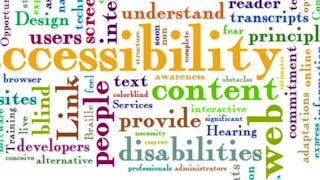In the education of children with visual impairment, there is a global movement away from segregated special schooling, and towards inclusive neighbourhood schools. Inclusion provides an opportunity for everyone, teachers as well as learners, to become more acquainted about life with visual impairment and to overcome some of the barriers of difference which have existed in the past. But if it is to be successful, teachers and others require key skills and insights in order to create classroom environments that fully accommodate the learning needs of children with visual impairment.

Gain next-level skills with Coursera Plus for $199 (regularly $399). Save now.

Teaching Children with Visual Impairment: Creating Empowering Classrooms

Instructor: Brian Watermeyer
11,167 already enrolled
Included with
(195 reviews)
What you'll learn
Recognizing that there are many different eye conditions and that each affects learning and behavior in children differently.
Tools to create empowering classrooms where you can teach children with visual impairment in an inclusive, accessible, and attuned space.
Identify ways of infusing the Expanded Core Curriculum into teaching and apply curriculum differentiation strategies.
Skills you'll gain
Details to know

Add to your LinkedIn profile
See how employees at top companies are mastering in-demand skills

There are 4 modules in this course
Welcome to the first week of the course! In this week, we take you on a journey to explore visual impairment and in doing so, help you discover the visually impaired child in your classroom. We consider the different educational settings in which visually impaired children may find themselves as well as different eye conditions and how these circumstances may affect the child’s learning and behaviour in the classroom. You will also start with the important task of creating an empowering classroom by learning how to create an inclusive space. At the end of the week, I have invited a group of visually impaired professionals to discuss some of the issues based on their experience. You will also have the opportunity to share your thoughts in the discussion forum and look through the list of further resources we provide. This week’s assessment is a quiz. May you have a rich and empowering first week.
What's included
9 videos7 readings2 assignments2 discussion prompts
Welcome to the second week of the course! This week we will deal in some detail with the Expanded Core Curriculum (or ECC). This is a collection of content areas that teachers integrate into the core curriculum to give visually impaired learners access to the incidental knowledge that sighted learners gain through observation. Various guest presenters will discuss the areas of the ECC, bringing you their specialist knowledge. A Braille specialist will introduce what Braille tuition may involve and provide a set of principles to support learners who are being taught Braille. At the end of the week, the panel discussion focuses on the ECCs potential to empower visually impaired learners. You will have an opportunity to share your insights on the discussion forum and add to your learning from the additional resources provided. The assessment this week is a written exercise where you can practice applying the ECC to a lesson of your choice.
What's included
8 videos3 readings1 assignment1 peer review1 discussion prompt
Welcome to the third week of the course! In this week you will learn about the need and importance of differentiating the curriculum for the children with visual impairment. This means modifying and adapting the curriculum according to the different abilities and learning styles of learners within a class. You will also learn about identifying suitable learning and teaching support material, assessment adaptations, and assistive technology devices or programs for each individual child with visual impairment. The week concludes as usual with opinions and experiences from our expert panel, an opportunity to share your thoughts with your peers in the discussion forum, additional resources to explore, and a graded quiz. This week you also have an opportunity to cover additional content on making learning materials accessible for the voluntary honors assignment.
What's included
13 videos2 readings3 assignments1 discussion prompt
Welcome to the last week on the course! In this week, you will gain further understanding about the importance of tending to psycho-social issues of visually impaired children by listening to them with respect, patience, and compassion. We will also describe practical things you can do to broaden your networks of support. Then you will hear from an experienced school principal about empowering yourself and your school through collaboration s. As it is the last week, we have invited our panellist to discuss this week’s topics as well as offering a final reflection on creating inclusive classrooms. The end of course assessment is a graded quiz, and we will leave you with a rich set of resources to support your endeavour to becoming an empowered teacher.
What's included
6 videos2 readings1 assignment1 discussion prompt
Instructor

Offered by
Explore more from Education
 Status: Preview
Status: PreviewUniversity of Cape Town
 Status: Preview
Status: PreviewUniversity of Cape Town
 Status: Preview
Status: PreviewUniversity of Colorado Boulder
 Status: Preview
Status: Preview
Why people choose Coursera for their career




Learner reviews
195 reviews
- 5 stars
90.81%
- 4 stars
6.63%
- 3 stars
1.53%
- 2 stars
0%
- 1 star
1.02%
Showing 3 of 195
Reviewed on Sep 23, 2020
Wow this course is amazing, I had no idea about how one curriculum van be looked at differently to accommodate all learners with different capabilities.
Reviewed on Aug 10, 2022
I love the fact that I never thought this topic could be so in depth. I had a blast and would recommend this course 10 out of 10 times.
Reviewed on May 12, 2024
This course remains one of the best things to happen to humanity. An inclusive world is possible and we are already underway.

Open new doors with Coursera Plus
Unlimited access to 10,000+ world-class courses, hands-on projects, and job-ready certificate programs - all included in your subscription
Advance your career with an online degree
Earn a degree from world-class universities - 100% online
Join over 3,400 global companies that choose Coursera for Business
Upskill your employees to excel in the digital economy
Frequently asked questions
To access the course materials, assignments and to earn a Certificate, you will need to purchase the Certificate experience when you enroll in a course. You can try a Free Trial instead, or apply for Financial Aid. The course may offer 'Full Course, No Certificate' instead. This option lets you see all course materials, submit required assessments, and get a final grade. This also means that you will not be able to purchase a Certificate experience.
When you purchase a Certificate you get access to all course materials, including graded assignments. Upon completing the course, your electronic Certificate will be added to your Accomplishments page - from there, you can print your Certificate or add it to your LinkedIn profile.
Yes. In select learning programs, you can apply for financial aid or a scholarship if you can’t afford the enrollment fee. If fin aid or scholarship is available for your learning program selection, you’ll find a link to apply on the description page.
More questions
Financial aid available,
¹ Some assignments in this course are AI-graded. For these assignments, your data will be used in accordance with Coursera's Privacy Notice.

